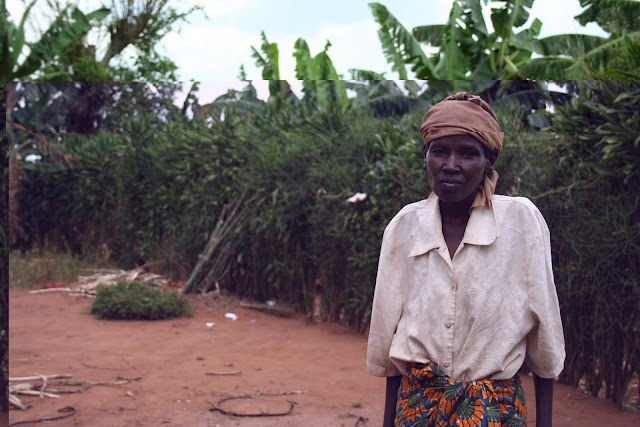It's been quite a while. I apologize for not updating anything very much. I feel like no one reads this blog anyway, so I don't have much motivation to write here.
We left for Kibuye after lunch on Friday. The journey was quite incredible. As soon as we passed out of Kigali, the landscape changed drastically. The mountains jutted out of the ground, green behemoths with carved out levels, where farmers had landscaped to be able to farm at ridiculous angles on the hillside. The highway wound up and around through the banana tree scattered hillsides, corn patched slopes, red earth roadside. It was so beautiful! I loved the trip. I also listened to some metal for the first time in a little while, which I enjoyed.
We arrived at the Hotel Golf on Friday evening and spent the night there. In the morning our adventure began-- we set out on a rickety boat to hike up Napolean Island, a jutting, angular mountain island in the middle of Lake Kivu.
 |
| Mikaela is is really excited to go to the island. |
 |
| Ryan on a rock. This gives you a sense of the steepness of this thing. |
This was the highlight of my trip. After this big hike we boated around the lake and made it back to the hotel. After church on Sunday we headed home. I will upload more pictures of the hike on Facebook.
The first day of our research was yesterday. I went around Gasharu, a town inside a cell inside the Muhazi sector where Procom will be doing development work in the next 10 years. Patrick was our translator, a very kind, smooth voiced student from the Kigali Institute of Science and Technology. He wants to do IT work when he gets out in March. I really liked him and he was extremely helpful!
We walked around the town with the help of some other man who knew the area (I didn't get his name). The compounds were close together, with plant fences and mud houses. Some of the houses were better than others. Some of the houses were obviously built with mud bricks and had an exterior finish with a more solid, cement foundation, and other houses were sticks in the ground with mud plastered over them. The households we were able to interview had weathered Africans to greet us-- for the most part the wife or son came to greet us and speak with us, as the father was generally working somewhere. Each household offered us chairs to sit down on. We sat and began to ask questions.
Sitting in the front or back yards of small, rural African households was a unique experience, to say the least. There were generally African children frolicking and bantering behind and around us as we inquired about daily life, income, and food for these people. All with tattered, secondhand clothes dirtied with daily use, hanging off shoulders, several sizes too large. Neon, rubber sandals on most children, some barefoot and filthy footed. The people we spoke to were sometimes solemn, sometimes funny, sometimes shy, sometimes loud, sometimes talkative, always willing to answer our questions.
It was heartbreaking to hear from all nine of the households we spoke with today that the only water is an hour away by foot, and that water is not clean. Every one of the places boils their water before they drink it to decontaminate it. Some of the families made about 5,000 francs a month, or the equivalent of 8 dollars in 4 weeks. There was one mother of four that was widowed and when we asked her what her monthly income was, she answered that she had none. She grew what she needed to survive, traveled to the market about once a year, and the rest of the time just survived. It was eye-opening, and at the same time, expected. I hope and pray that in ten years when Procom goes back to measure the progress, that people will have better access to necessities than what they have today.
Today's interviewees had similar stories. One woman had no income and was getting about one meal a day, generally. She was a widow and her name was Mary Odeth Kayitesi, and she was quiet while we spoke with her in her home.
 |
| She spoke softly. |
Another person we interviewed was named Emerita Nyirabatunzi. She was also a widow, and HIV positive.
She had one child in secondary school, and has to walk half an hour to the lake to get water, and then boil it because it is dirty. Her average monthly income is 1000 rwf.
Research continues tomorrow. Practicum begins next week. I find out what I'll be doing tonight!

I'm lovin it Arley. What an amazing picture with Ryan of the hill! Keep up the posts and the pictures. It always makes my days better roommate :)
ReplyDeletegreat pictures, Arley! Miss you!
ReplyDeleteArnie.
ReplyDeleteI am reading, please keep writing
ReplyDelete